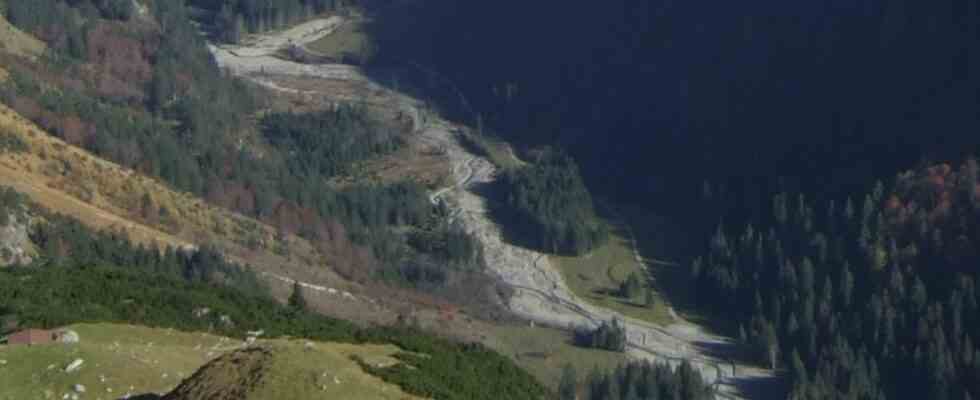After the snow melts in spring, the Rappenalpbach is restored. Environment Minister Thorsten Glauber (free voters) assured this on Thursday in the state parliament’s environment committee. “We will reverse the deepening and channeling of the torrent and do everything we can to return it to its original dynamic,” said Glauber. “Plans are already underway.” At the same time he condemned the outrage on nature again. “Such an intervention in a protected area is unacceptable, it was certainly not an accident,” said the minister, pointing out that the perpetrators of such environmental crimes face fines of up to 50,000 euros and even prison sentences of up to ten years.
The destruction of the Rappenalpbach is the worst natural crime in Bavaria for years. The mountain stream that flows through the Rappenalptal near the Oberallgäu village of Oberstdorf is one of Bavaria’s natural treasures. It is strictly protected under German and European law and attracts numerous visitors – of course also because of the idyllic alpine pastures there, where young cattle and cows graze in the warm season. Numerous rare grasshoppers, special butterflies, sandpipers and other endangered bird species live on the banks of the Rappenalpbach.
This autumn, the Alp farmers dredged, straightened and channeled the Rappenalpbach over a length of 1.6 kilometers and a depth of up to two and a half meters – in order to repair damage caused by a flood in August 2022, as they say. In some sections, the workers even pushed through the bottom of the stream with their heavy equipment, so that the Rappenalpbach dried up there. An area of nine hectares is affected. That’s about the size of twelve soccer fields. The former, unique variety of plants and animals on it has been completely lost. According to conservationists, it is unclear whether it can be restored.
The Alp farmers had the Rappenalpbach dredged two and a half meters deep. In some sections they even pierced the bottom of the stream so that it seeps away there.
(Photo: Barbara Frey/BN)
Since the outrage on nature became known in October, a wild argument has been raging about who is responsible for it. Nature conservationists, authorities, lawyers and the courts agree that river engineering work of this magnitude in such a top-class nature reserve cannot and was not approved. However, it is unclear what role the district office played in the case. The Bavarian administrative court in Munich recently accused the authority of having – to put it mildly – made such misleading statements to the alpine farmers that they could assume that the work was okay. In addition, the district office was too lax when it stopped construction and its controls later.
For Environment Minister Glauber, the case is nevertheless clear. “Of course, flood damage has always been repaired in the Rappenalptal in the past,” he said when asked by the committee. “But those were maintenance measures.” The gravel was fetched from the pastures that the mountain stream had washed there. The current dredging, straightening and channeling is a completely different dimension from his point of view. “This is a water body expansion,” said Glauber. This is generally not allowed in a nature reserve. In addition, it would require a complicated and time-consuming approval process and is by no means only possible by agreement.
CSU and FW express a lot of understanding for the Alp farmers
Nonetheless, the CSU and Free Voters showed a great deal of understanding for the Alp farmers. Both parties warned urgently against their prejudice. From the point of view of the CSU deputy and deputy head of the environment committee, Eric Beißwenger, the outrage on nature is not nearly as dramatic as it is from the experts’ point of view. “This is now a situation like after a flood, like we have every one to five years,” he said. “There are still habitats.” And the fact that the Rappenalpbach dried up in sections after the work, he said was “typical for a loose, gravel-rich river bed”. Benno Zierer (FW) called for trusting in “the self-healing powers of nature” and was confident that the damage would “take a year or two to grow back”.
Greens, SPD and FDP first want to know in detail how the outrage on nature could have happened. “There must be no taboos when investigating and clarifying this case,” said Green politician and chair of the environmental committee, Rosi Steinberger. “Even if government agencies were involved, it must be clearly stated where there were errors.” Christoph Skutella (FDP) also called for “quick and transparent clarification, especially at the local level”. Florian von Brunn (SPD) called for targeted advice to the alpine and alpine farmers on what they are allowed to do in nature reserves and what they must refrain from doing. Otherwise, a crime like that in Rappenalptal will soon be repeated.

